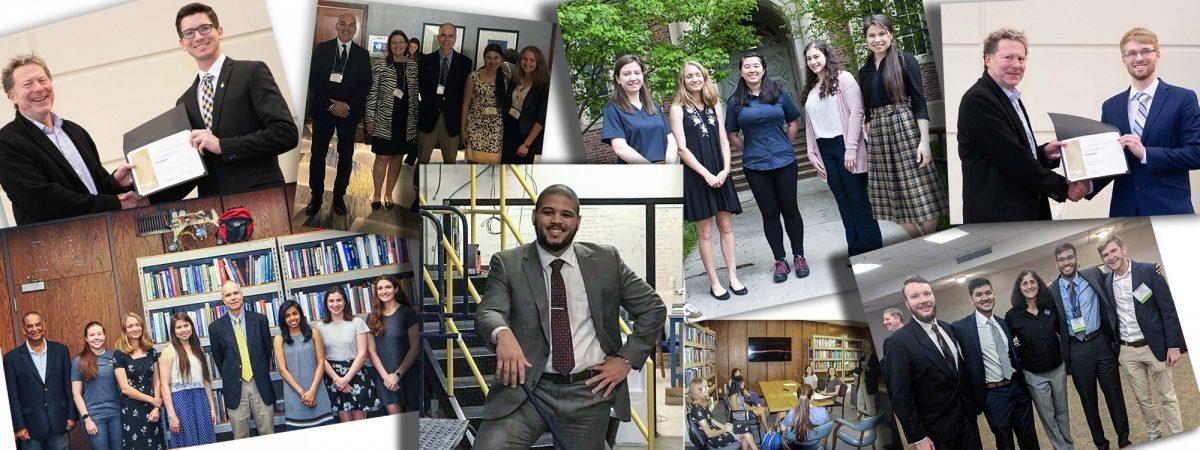
Many of the AE School's brightest stars have recently been recognized by a variety
of awards and scholarships. Here's a look at some of the honorees.
Vertical Flight Society Chooses Benjamin Leon for the 2019 Lichten Award
Doctoral student Benjamin Leon has been chosen to receive the prestigious 2019 Robert L. Lichten Award for his paper, Ground and Flight Tests of a Cable-Driven Four-Bar Linkage Robotic Landing Gear for Rotorcraft.
The paper explores Leon's research into a robotic landing gear (RLG) innovation that could improve access for rotorcraft seeking to land in mountainous terrains. Funded by the Defense Advanced Research Projects Agency (DARPA), the research demonstrates the design, integration and testing of the RLG system installed in a commercial S-100 Camcopter. Leon worked closely with his advisor, Prof. Claudio V. Di Leo and Prof. Julian Rimoli, to fine-tune the paper, one of several that he has developed from the three-year research assignment. read more
(text and background only visible when logged in)
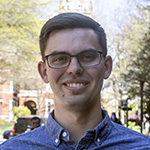
National Science Foundation: Sara Miller
The National Science Foundation selected first-year aerospace engineering grad student Sara Miller to receive a 2019 NSF Graduate Research Fellowship. The Smithtown, New York native will use the NSF fellowship to continue research that focuses on the characteristics of engine degradation in electric propulsion engines. Guiding her will be her advisor, Prof. Mitchell Walker, who heads up the AE School's High Power Electric Propulsion Lab. read more
(text and background only visible when logged in)
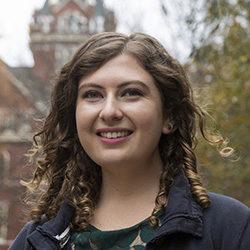
NASA Space Technology & Research Fellowship: David Gomez and William Jun
The NSTRF is bestowed each year to encourage research in groundbreaking, high-risk/high-payoff, early stage space technologies. A third NSTRF recipient, Ethan Hopping, will leave his job at Blue Origin this fall to begin his full-time doctoral studies under the guidance of Prof. Mitchell Walker.
Gomez will work in the High Power Electric Propulsion Lab (HPEPL) under the guidance of Prof. Mitchell Walker. His project: "Development of a Highly Throttlable, Bipropellant (Xe-Kr) Hall Thruster and Investigations into the Newly Discovered Oscillation Modes in Magnetically Shielded Thrusters” Jun will work with Prof. Glenn Lightsey in the Space Systems Design Lab. His project: "A Novel Navigational Architecture for Localization on other Planets using a Single-Satellite with Limited Satellite Resources" read more about their plans
(text and background only visible when logged in)
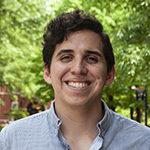
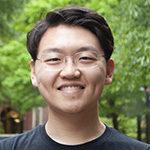
The Sikorsky Scholarships
Nine AE School undergrads received scholarships of between $500 and $1,000 from the Sikorsky Scholarship Fund, a support pipeline that was established last year by Regents Professor, Dr. Lakshmi Sankar, AE's longtime associate chair for undergraduate programs. Sankar repurposed funds that came to him as the Daniel Guggenheim School's Sikorsky Professor to support the students, all of whom have demonstrated a strong grasp of the discipline through their coursework and/or lab research.
Receiving the scholarships were graduating undergraduates Katherine Kwasniak, Katie Gross, Erica Hulette, Alexandra Minor, Kelsey Pepper, Mahalakshmi Srinivasan, and Madison Stein. Two other recipients, Emily Bates and Abigail McClain, will continue their undergraduate studies at the AE School.
Helping Sankar to award the funds on April 12 was another high-performing AE student, Dr. Brian Wake, PhD AE '87, now a Lockheed Martin Fellow, Aerodynamics and Special Projects at Sikorsky. Wake happens to have been the first of 46 doctoral students to have been mentored by Sankar, (who also earned his doctorate at GT-AE in 1977).
"The presence of Brian demonstrated to these students just how far they can ascend with their degrees," said Sankar. "We can certainly anticipate that these students will continue to encourage and mentor future generations of AE School students that come after them. That's a tradition that has built the AE School legacy."
(text and background only visible when logged in)
(text and background only visible when logged in)
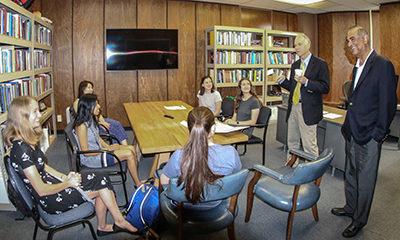
The Good Ole Days Are Now. The 2019 Sikorsky Scholars swapped stories with a student who walked these halls before they did: Brian Wake, PhDAE'87. (That's Wake's dissertation advisor, Prof. Lakshmi Sankar, playing host.)
Women in Engineering Scholarships
More than $8,000 in scholarships were awarded to AE students by a variety of industry sponsors at the 2019 Georgia Tech Women in Engineering Banquet held April 11. All together, more than $160,000 in scholarships were awarded to 155 female students in the College of Engineering.
"We are awed and humbled by the generous support of steadfast supporters like Boeing, Northrop Grumman, Aptiv and others," said Dr. Christine Valle, the director of the Women in Engineering program at Georgia Tech.
They know that women provide a different perspective and a different lived experience that are extremely valuable as they design products that affect our entire population. They know that supporting, recruiting, hiring and retaining the best female engineering talent in the country is critical to keeping their companies successful, now and in the foreseeable future."
Receiving $1,500 scholarships from the Boeing Company were Danielle Dixon (first year), Bridget Wiley (second year) and Alexandra Matlack (senior). Raven Barnes, (first year), Clarisse Matyczyk (third year) and Karena Fiore (senior) each received $1000 scholarships from Aptiv Corporation. Senior Sanjana Tewathia received a $1,000 scholarship from Siemens. read more
(text and background only visible when logged in)
(text and background only visible when logged in)
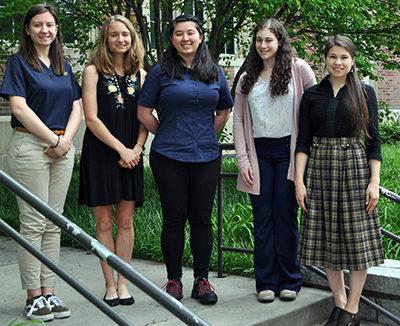
WIE Scholars. (from left): Clarisse Matyczyk, Erica Hulette, Karena Fiore, Alex Matlack, and Abigail McClain
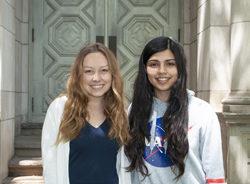
WIE Scholars. Danielle Dixon and Sanjana Tewathia
Amelia Earhardt Fellowship
Doctoral student Aarohi Shah has been selected to receive a 2019 Zonta International Amelia Earhart Fellowship. The Fellowship was established in 1938 to honor legendary pilot Amelia Earhart, herself a member of the global women's advocacy and service organization. The $10,000 award is bestowed annually on 35 women who are pursuing doctoral degrees in aerospace-related sciences or aerospace-related engineering.
Advised by Prof. Julian J. Rimoli, Shah was selected last year to receive the AHS Lichten Award for co-authoring, "Closed Loop Approach to Structural Health Monitoring for Critical Rotorcraft Components.” This year, she was one of two GT-AE recipients of a 2019 Vertical Flight Foundation Scholarship.
Shah is developing reduced-order structural models to extend the life of critical rotorcraft components.
"This approach reduces the overall effect of fatigue by a load alleviation scheme which gets triggered after inputs from the reduced-order damage models. Overall, this approach can lead to significant savings in cost related to component maintenance and replacement," explained Shah.
"I am honored for being selected as an Amelia fellow. The funds provides a mean to network with other professionals in my field of work by traveling to conferences and events. This will help me discuss my work and get useful feedback from established industry and academic professionals."
read more
(text and background only visible when logged in)
(text and background only visible when logged in)
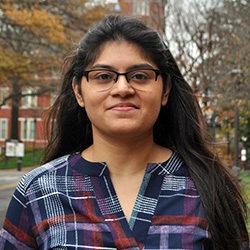
Aarohi Shah
Grad RISE Scholarship
For the second year in a row, grad student Jean Luis Suazo Betancort has been selected to receive the Retaining Inspirational Students in Technology and Engineering (RISE) Scholarship.
RISE scholars display persistence within their engineering program, leadership and service. They are expected to serve as mentors and/or tutors to other Georgia Tech students and prospective students.
Betancort said he is deeply committed to his research in the High-Power Electric Propulsion Lab (HPEPL), but never so much that he forsakes his calling as a mentor and leader to younger students. In addition to AE undergrads in the HPEPL, he oversees some high school students who are enrolled in the ENGAGES program.
"I have a lot of things to juggle - classes, research, and even the eight hours a week where I'm still working remotely for The Aerospace Corporation in Virginia - but I know that my job in the lab is to help younger students, and those new to STEM, to stay on task. All of our interactions should be with their best interests in mind, so that they learn technical skills, critical thinking skills. In the end, they may or may not contribute a lot to the research, but they can learn how to ask question, how to scope out a problem. That's a life skill, something they'll always be able to use." read more
(text and background only visible when logged in)
(text and background only visible when logged in)
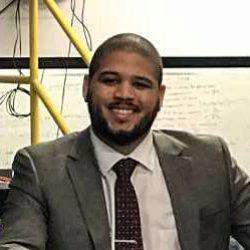
Jean Luis Suazo Betancourt
American Institute of Aeronautics and Astronautics
The scholarship of several AE students was recognized in early April at the AIAA Southeastern Regional Student Conference, held in Cocoa Beach, Florida.
Taking home the top honor in the "Team" category was "Implementation and Verification of a Modular GN&C and Flight Software Architecture for an Active Control Launch System," a paper written collaboratively by Yellow Jacket Space Program (YJSP) members Kunal Gangolli (AE), Athreya Gundamraj (AE), Wyatt Hoppa (ECE), and Shrivathsav Seshan (ECE).
Their paper outlined the late-stage development, integration, and test of a Level 2 rocket that serves as a testbed for avionics and GN&C (guidance, navigation & control) for a canard-based active control vehicle.
The winning paper in the "Master" category was "Design and Testing of a Fault-Tolerant Space Suit," written by ASDL grad student Johnie Sublett.
"The paper demonstrates technology that could allow us to predict and mitigate catastrophic space suit punctures along the majority of the body," Sublett explained. "It includes a distributed sensor array for detection and a set of pressure bladders that inflate when the suit's seal is broken."
Each of the first-place honors came with a $500 award and an invitation to represent the AIAA Southeast Region at the AIAA Foundation International Student Conference, which takes place during the AIAA SciTech Forum in January 2020.
On hand to bestow the awards was AIAA Southeast Region director Kurt Polzin, and NASA astronaut Sunita Williams, a veteran of both the Space Shuttle and Soyuz missions. read more
(text and background only visible when logged in)
(text and background only visible when logged in)
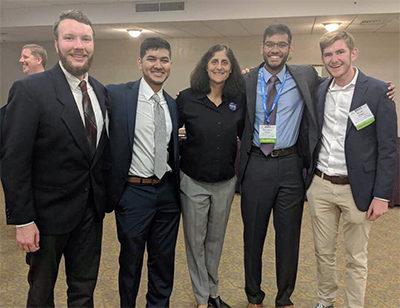
Space Enthusiasts. Members of the Yellow Jackets Space Program were thrilled to meet NASA astronaut Sunita Williams (center). From left: Johnie Sublett, Kunal Gangolli, Williams, Shrivathsav Seshan, and Wyatt Hoppa
Undergraduate Research Award: Kelsey Pepper
Georgia Tech's 14th Annual Undergraduate Research Symposium highlighted the work of graduating senior Kelsey Pepper who was chose for the Outstanding Undergraduate Researcher Award for Aerospace Engineering. Her classmates, Utkarsh Pandey and Anish Shenoy took home second place for their oral presentation of "RL-10-3-3A Rocket Engine Turboprop System Level Design & Optimization Trades." Read their abstract (pdf)
In addition to the crystal trophy, Pepper received a $200 stipend for her work, "Flame Visualization of Hall Thruster Propellant Distributors." Pepper's work continues research begun with her advisor Prof. Mitchell Walker in which the luminosity of flames coming from a propellant distributor is studied to ultimately determine the condition of the thruster's anode. Starting at an equivalency ratio of one for propane and air, other gas ratios are explored to see other indicators of a problem," Pepper said.
"If you have different ratios, it could indicate a leak, a degraded or clogged anode, or another instability in the system," she said. "So we have this novel way of testing for uneven flow. What we do is we light the gas mixture coming from the anode and observe the luminosity of that flame around its entire circumference. If the luminosity of the flame is the same at every point along that circumference, we know we have completely uniform flow. If not, we start to look for problems." read more
(text and background only visible when logged in)
(text and background only visible when logged in)
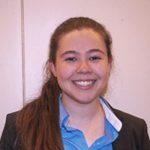
Kelsey Pepper
Four AE School Students Receive the Matthew Isakowitz Fellowships
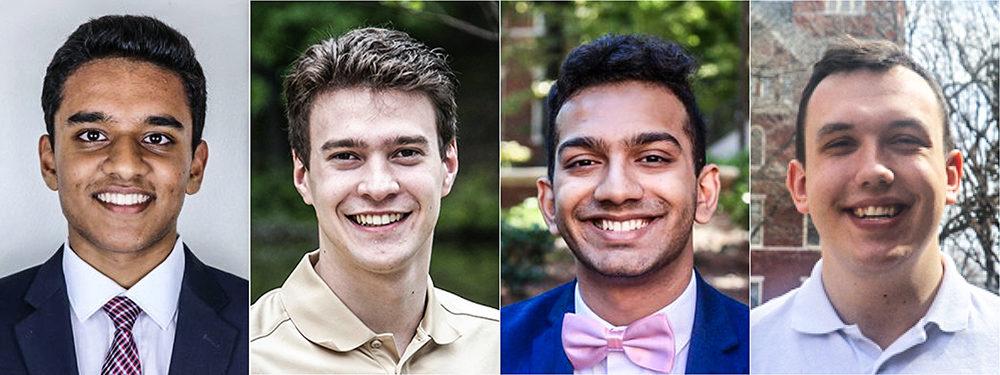
2019 Isakowitz Scholars. From left, Sahaj Patel, Patrick Miga, Shravan Hariharan, and Josh Ingersoll
Four Daniel Guggenheim School students received summer internships at commercial aerospace companies and will also receive a year of one-on-one mentorship from an aerospace industry professional, thanks to the 2019 Matthew Isakowitz Fellowship program
The four are Sahaj Patel, Shravan Hariharan, Patrick Miga, and Josh Ingersoll .
Now in its second year, the Isakowitz Fellowship annually recognizes exceptional undergraduate and graduate students pursuing aerospace careers.Their summer internships will culminate in Los Angeles at a two-day Isakowitz summit where they will meet and network with other fellows, tour several commercial aerospace companies, and learn more about the latest developments in commercial spaceflight from top innovators in the field. find out more about the 2019 Isakowitz scholars.
(text and background only visible when logged in)
Institute Honors & Awards Event Recognizes Three AE Students
An April 16 Institute Awards Event shined the light on three exceptional students from the Daniel Guggenheim School.
Cason Butler was recognized with the Aerospace Engineering Outstanding Senior Scholar Award. Funded through an endowment established by former school chair Donnel W. Dutton, AE '40, the $1,000 award is given annually to the graduating student with highest cumulative GPA. Butler has earned a perfect 4.0 grade point average at both Georgia Tech's Daniel Guggenheim School of Aerospace Engineering and at Georgia College and State University, where he majored in physics. At Geogria Tech, he has worked on the design of Space Mission to Jupiter’s L5 Point, and on a VTOL multiple configuration aircraft.
Frank K. Kozel was selected for the Donnell W. Dutton Outstanding Senior in Aerospace Engineering Award. The $1,000 award is given annually to a student who has demonstrated excellence both in and outside the classroom. That description fairly well describes Kozel, who for the past three years, has worked tirelessly as the chief engineer for Tech's entry to the SAE Aero Design-Build-Fly competition.
"Frank Kozel has led and participated in the design, prototyping, and flight test of many novel and unconventional aircraft during his time at Georgia Tech," said Kozel's mentor, Prof. Brian German. "I have been amazed at his and his teams’ ability to do an A-to-Z design, build, and successful test effort in a very short time. Frank’s unique skills position him for an amazing career in technical leadership in the new era of aviation that we, as a society, are now entering.”
Third-year student Savannah Jade Langer was tapped to receive the CoE Honors Day Award, an honor that is given out to engineering students with the best academic records at the end of their third year of undergraduate study. We're glad we have her for another year, at least.
(text and background only visible when logged in)
(text and background only visible when logged in)
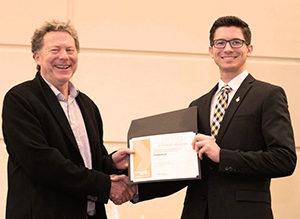
Frank K. Kozel, right, was also named to the 2019 AIAA/Aviation Week Network's 20 Twenties List
(text and background only visible when logged in)
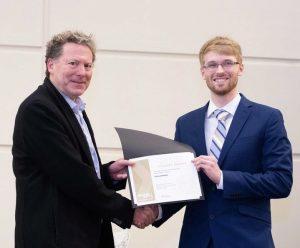
Cason Butler, BSAE and BS Physics
Vertical Flight Foundation Recognizes Two AE Doctoral Students: Aarohi Shah and Feyyaz Guner
Two Daniel Guggenheim School of Aerospace Engineering doctoral students, Aarohi Shah and Feyyaz Guner ,have been chosen to receive scholarships from the Vertical Flight Foundation.
Shah received the $6,000 Jing Yen Cost Awareness Scholarship that is awarded to doctoral students who show interest in improving the affordability of rotorcraft. Shah’s submission included her research with Prof. Julian Rimoli on reduced order damage models for fatigue prediction in rotorcraft vehicles.
Guner was recognized with the Dr. E. Roberts (Bob) Wood Scholarship - named in memory of former Georgia Tech aeromechanics professor Dr. Bob Wood - for his submission on inflow modeling for multi-rotor configurations. Guner will use the $,650 scholarship to support his doctoral research with Prof. J.V.R Prasad on the interactions, and interferences of multi-rotor configurations to improve the fidelity of flight simulations and pilot safety.
“I’m really appreciative of the fact that they (VFF) consider Ph.D. students for these types of scholarships in the rotorcraft field. It motivates us to continue to pursue a career in rotorcraft,” said Guner.
(text and background only visible when logged in)
(text and background only visible when logged in)
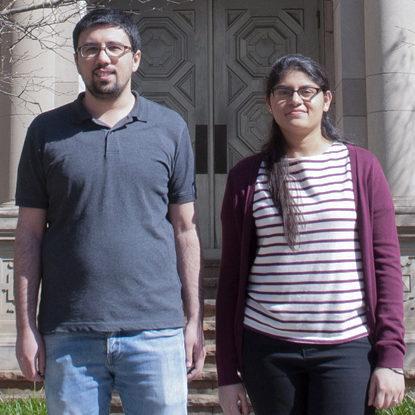
Feyyaz Guner and Aarohi Shah
Three Daniel Guggenheim Aerospace Engineering Students Named 2019 Brooke Owens Fellows

Traveling Engineers. As Brooke Owens Scholars, Ashleigh Bunch, Rikki Roy, and Saumya Sharma, will be interning in Washington, Virginia, and California this summer
Three School of Aerospace Engineering undergrads - Ashleigh Bunch, Rukmini “Rikhi” Roy, and Saumya Sharma - have been named fellows in the 2019 Brooke Owens Fellowship cohort.
As "Brookies," each will embark on a 12-week internship this summer and be assigned to two aerospace engineering mentors - one of whom will be from their host company. They will also travel to Washington, D.C. this summer for the Brooke Owens Fellowship Summit, where they will meet 35 other 2019 Brookies. The Brooke Owens Fellowship was established in 2017 to honor the legacy of a beloved space industry pioneer and accomplished pilot, Dawn Brooke Owens, who died of breast cancer in 2016. It is bestowed annually on college-age women who show promise in the aerospace field.
As her internship assignment, Bunch will be working with drones at Amazon Prime Air in Seattle, Washington. Roy will be interning with Bryce Space and Technology in Alexandria, Virginia where she'll be managing data for the company's clients and synthesizing results for a report "Small Sats by the Numbers." Sharma will be working on the mechanical engineering subsystem team that is building satellites at Astranis Space Technologies, a start-up company based in San Francisco.